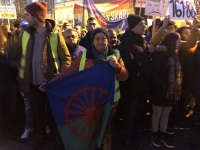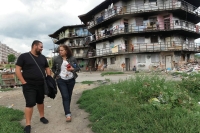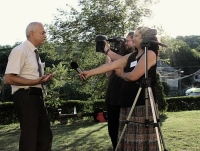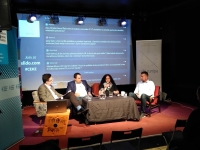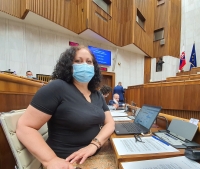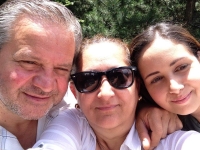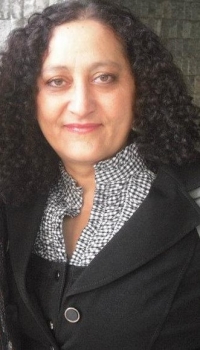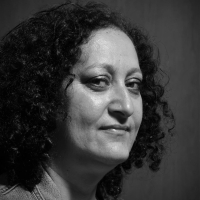Mgr. Jarmila Vaňová
* 1965
-
"I was right in this action, it was my topic the police violence. I don't know if I was so stupid or so brave that I went into these topics and didn't feel any threat. Even though it happened to me that they played the "march of boots" to my phone at night, or they sent me letters with Nazi symbols. But somehow I didn't care about it. My first encounter with police violence or brutality was in Strány pod Tatrami. That was even earlier than in Moldova, I guess. And it was a coincidence because a lot of things were hidden or overlooked back then. And the Roma themselves suppressed it. Because they didn't want to have problems with the cops. And even though there were such raids that they were looking for some person and I don't know what, so basically the circus was done, but then there was a quasi-peace because it got quiet. But it didn't stop in Strány, for example, because there was a Roma self-government and they called us that no media wanted to come there and that something terrible happened yesterday because the cops came and smashed windows, and entered homes without permission and did house searches and beat people. So I was in Strána the next day. And we went there to shoot, we saw what we saw and we gave information about it. I then asked a spokesman from Prešov, then a police spokesman, to comment on this. He asked three questions by e-mail, so I sent them to him, but a good journalist will always give a fourth, of course, unwritten one. Coincidentally, there was an Austrian director with me at the time, my girlfriend, who was in Slovakia and wanted to come to the shooting. I asked him three questions and then I asked him if he had such an experience that such a thing would happen in a village without Roma inhabitants. Because he said that everywhere, similar things also in proportion can happen. And of course, he confirmed that no."
-
For example, it was not appropriate to speak Romani in public. And many Roma families have actually lost their language through strong assimilation and coercion, and they can no longer speak it. Paradoxically, at locations, where the communities were isolated and where the languages was cultivated "at home" and the Roma community was bigger, the language remained "purer". You will find in it really few "borrowed words" or other words, for example, taken from Slovak. Because Romani is not such that if you walk down the street and every other word is Slovak, everyone will understand it, this is not Romani. But the great damage to our language, of course, we were not allowed to cultivate our own culture. All our quasi-good musicians mostly played Slovak folklore. Of course also the Roma one, but that was already within the scope of other possibilities and other activities. So even at that time, during socialism, I did not perceive that we were being treated unfairly. Of course, we knew who we are, what we are, and we cultivated our Roma identity... They actually locked it up for us in our homes, in our settlements, in our apartments. And you either accepted it or you wanted to adapt. We accepted it and basically lived our lives as if in such collaboration with everyone else, where we didn't make it very public that we were who we were, but when we were together, it was clear that it worked.
-
My aunt said they were Russians, so if they're Russians, it's okay. It won't be bad. But then my mother came from work, she repeated it to us several times, when this time was mentioned. So she said that there was a shooting in Košice. And both my parents worked in Košice. And then I guess the Slovan hotel was built. That's what today's Hilton was called then. And she said there were a lot of bricks and stuff ready. And that when they started firing from machine guns, everyone lay behind them. Mom came with her knees bruised because they were at the centre of it. And they were scared and it was a very powerful experience for them because they hadn't encountered anything like that before. Dad was (there)also, they were together. And he said that something big was happening in Košice, because of the shooting. In the villages, some people, as far as I know, in our locality there was strong resistance against these troops. And for a very long time, posters with the words "freedom" were hanging from the huge shopping centre. And they kept re-painting it, but it was still visible. So I remember as a child the word freedom was still legible there and we perceived it.
-
Celé nahrávky
-
Bratislava
(audio)
délka: 02:14:24
Celé nahrávky jsou k dispozici pouze pro přihlášené uživatele.
There is no need to give in to evil, once you give in, you will give in for the rest of your life
Mgr. Jarmila Vaňová was born on May 8, 1965, in Košice as the second of four children. Until the age of thirteen, she lived in the village of Ďurkov. She graduated from primary school in the years 1971 - 1979. She attended the first school in Ďurkov and went to the lower secondary school in the nearby village. During primary school, she moved to Košice, to a housing estate in the „Dargovskych hrdinov“ district. From 1980 to 1984, she attended the Vocational High School on today‘s Boccatiova Street with a focus on trade. After graduation, she joined Prior‘s subsidiary as a saleswoman, where she practised during her high school studies. In 1983, her daughter Lucia was born, in 1985 Klaudia, in 1992 her third daughter Karolína and in 1997 her son Karol. After her last maternity leave, Jarmila enrolled in a women‘s program for Roma women, the aim of which was for Roma women to go to the local elections in the 2004 elections. After the election, she began working as a journalist. She graduated from second high school and subsequently from university, both focused on social work. In the years 2017 - 2019, she worked at the Luník IX housing estate in Košice as a field social worker. She worked in the Roma national broadcasting in RTVS, as the director of Roma media - ROMED as well as as the editor-in-chief and program director of the Roma media centre. In 2020, she was elected a member of the National Council of the Slovak Republic. She ran for the OĽaNO party.
